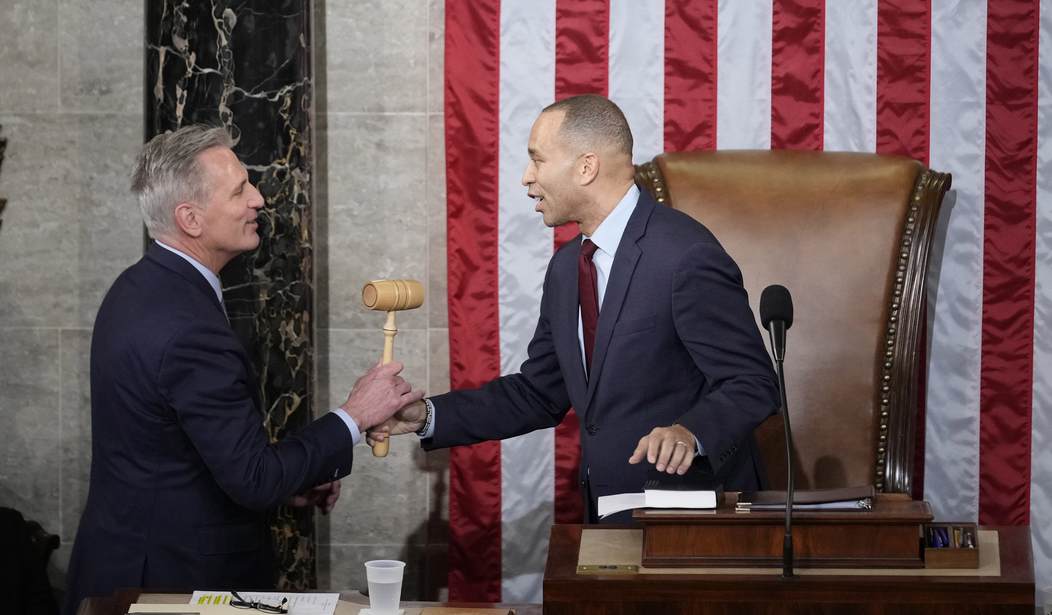This is a poll of Republican-leaning voters, I'll underscore right out of the gate, not of the broader electorate. The question posed is whether these voters would prefer to see the new GOP House majority (a) gravitate more towards compromise and working with the president and his party, or (b) primarily digging into an opposition role. I would have anticipated a lopsided response for the latter option, but that's not exactly what CBS News found in this survey result. It found a dead heat:
Striking finding in the new @CBSNews national poll:
— Sahil Kapur (@sahilkapur) January 8, 2023
Republicans split evenly on how the House majority should use its power: 48% say work with Biden/Democrats, 52% say focus on opposition.
(Among self-ID’d MAGA Republicans, over 2-to-1 say oppose.)https://t.co/ARtcBSNiBJ pic.twitter.com/dYNtz4gLLp
I'm surprised that nearly half chose the former option, including a third of self-identified 'MAGA Republicans.' I'd tend to side more with the 'focus on opposition' bare majority, because the overwhelming point of electing a red House was to put an end to one-party rule. Democrats had done enough damage over two years, and what was needed was a powerful brake on that agenda. Someone to say 'no.' That someone is newly-minted House Speaker Kevin McCarthy, who can kill Democratic schemes and excesses dead in their tracks. That's the key function of the job, given the current constellation of power in Washington, DC. However, Republicans famously under-performed in historic fashion last November, despite winning the public opinion arguments on most of the campaign's top issues. They fell short of their potential and failed to live up to historical precedent because independent and swing voters (the people who tend to make majorities and elect presidents) split their votes nearly evenly between the unpopular in-power party and the unpopular out-of-power party. The typical clear advantage for the opposition in times of widespread discontentment didn't materialize.
Recommended
This was especially true at the federal level, as many voters couldn't bring themselves to support candidates perceived as too crazy or too tied to the former president. More mainstream candidates, especially governors across the center-right ideological and temperamental spectrum, won -- often handily. But others sagged substantially behind those sorts of Republicans, suppressing the party's House gains, and preventing the GOP from recapturing the US Senate. Many of the voters who were most responsible for Democrats' over-performance were not enamored of Democrats' governing record. Many disapprove of Joe Biden. But they couldn't quite get to the point of holding their noses and voting R this time. A lot of these voters, and apparently quite a few others who are more solidly Republican, will expect to see checks, balances, accountability, and opposition...to a point. But they will also expect to see some semblance of functional governance, too, as we've been saying. 'Normie' voters aren't like political addicts and terminally-online junkies. They recoil at chaos and abnormalcy. They punish politicians and parties who shake these sensibilities too often.
Republicans would therefore be wise to reject much of what Democrats would have attempted to do under unified government, of course, but also to pick their spots in saying 'yes.' This will require discerning prudential judgments and fairly unified buy-in, which is why last week's Speaker saga was less concerning as a 'crisis' (it wasn't) than as a prelude to multiple crippling rounds of high-decibel dysfunction over the next two years. In their essential opposition role, Republicans should draw certain red lines, obviously, and home in on accountability-minded areas of inquiry that will attract broad support -- or at least widespread acknowledgement that such scrutiny is warranted. The Afghanistan debacle. The border crisis. And, without a doubt, this:
Randi Weingarten wants to gaslight people into believing her union wanted schools open despite all evidence to the contrary. Time for congressional hearings. Hop to it, House GOP. https://t.co/3EIunIcV5E
— Rory Cooper (@rorycooper) January 9, 2023
The gaslighting from Weingarten and other teachers union bosses will enrage a great many parents, and must be actively exposed and countered. Not just on social media, but within the halls of power. Under oath. On the record. Let it never be forgotten that the unions used their partisan clout to alter official "science," in order to advance a selfish political agenda, at the expense of children's education and well being. Adjudicate and re-litigate that aggressively, particularly because of the shameless revisionism being attempted. It's also fine for Republicans to pursue more partisan and base-galvanizing fascinations, such as Hunter Biden's laptop story or the FBI's political weaponization (both of which deserve a hard look), but they should beware of overreach. Not 'Democrats and journalists whine' overreach, but 'normie voters think this is weird and problematic' overreach. Much of this comes down to making savvy choices and wise judgments. On that score, I'll leave you with this piece from earlier in the week -- which is compellingly and cleanly argued, in my view, and is also notable because of who wrote it and where it appeared:
A Claremont Institute senior fellow & Senior Editor of the Claremont Review of Books lays out his case against nominating Trump again in 2024. Superbly argued, worth reading/considering:
— Guy Benson (@guypbenson) January 9, 2023
“Do [GOP voters] want to make a statement or to win an election?” https://t.co/chGW1XuBsq
A frenzied 'Never Trump' Bulwarkian screed this is not. Rather it's a cold, clinical look at why, in the author's estimation, "there is no sound or even sane risk/reward assessment that culminates in choosing Donald Trump to be the 2024 GOP presidential nominee:"
“Politics ain’t beanbag,” journalist Finley Peter Dunne declared in 1895. Neither is it a form of therapy or a vehicle for affirming group solidarity. Republicans pondering what to do in 2024 must engage the question Democrats faced 48 years earlier: Do we want to make a statement or to win an election? Is the point to air grievances and manifest defiance against the woke Democratic Party and its academic, journalistic, and corporate auxiliaries? Or is the objective to achieve the virtuous circle of partisan politics: win elections, thereby acquiring power, which is used to enact sound policies, ones whose beneficial effects increase the likelihood of winning future elections? ... We know too much in 2023 to think that Trump will be a better politician in the future than he has shown himself to be in the past. To begin with, we know too much about Trump as a Republican presidential nominee to be confident that he’ll prevail against Joe Biden, Kamala Harris, or some other Democrat in 2024. Given that Trump won 46.1% of the popular vote in 2016 and 46.8% in 2020, we have every reason to believe that his ceiling is on the wrong side of 50%. This is a problem.
In 2016, many things had to go just right for Trump to translate his second-place finish into an Electoral College majority, starting with third-party candidates winning 5.7% of the vote and Hillary Clinton’s singular shortcomings as a politician. To predicate another presidential nomination on such favorable conditions falling into place once more is to invite defeat. There’s little reason to think that Trump can crack this ceiling and improve upon the results he got in 2016 and 2020. Since announcing his candidacy in 2015, Trump has been the nation’s dominant political story: the most discussed person in public life and the most polarizing. At this point, the number of voters who feel they still don’t know enough about him to form an opinion would barely fill a high-school auditorium. Within the 53% of the electorate that has voted against him twice, the subset that is amenable to being won over in a third contest must be even smaller. In 2016, Trump won 48% of independent voters against Hillary Clinton’s 42%, according to exit polls. Four years later, he lost among independents by 54% to 41%...Not even unanimous support by Republican voters would make him competitive in a general election...
The Resistance strengthened Trump’s bond with his voters by giving them a shared grievance: he had won the 2016 nomination and election after playing by the rules; they had voted for him in the good-faith expectation that their duly elected candidate would enjoy the same powers and authority under the Constitution as did his duly elected predecessors; but Washington’s permanent government set out from Day One to override voters’ judgment with its own. The belief that the Establishment stole a second term from Trump and his voters is of a piece with the belief that it worked, unremittingly and with considerable success, to steal his first term. Trump’s most committed followers ended up more aggrieved after the 2020 election than they had been before the 2016 one. The resulting determination to treat 2024 as a last chance to send a message that rebukes these tormentors, his and theirs, is a powerful one. Two things can be true, however: that Trump was unfairly maligned and thwarted; and that he made the worst of a bad situation ... A political party that wants to prevail or even survive must treat these contests seriously, putting forward its most promising rather than its most victimized candidates...Even if one stipulates that the transgressions Trump committed were less serious than the ones he suffered, the Republican Party exists to win elections and govern wisely, not to validate and nurture grievances. Its ultimate objective of principled victory cannot be reconciled with nominating Donald Trump for president in 2024.
Agree or disagree, I strongly encourage you to read and think through the whole thing. The 2022 midterms, coupled with 2018 and 2020's setbacks, offer a number of hard and clear lessons for Republican voters. Whether they can collectively accept and act on these lessons in a strategic way may determine whether 2024 represents a needed bounce-back or a devastating own-goal. Important decisions are coming. Choose wisely.

























Join the conversation as a VIP Member